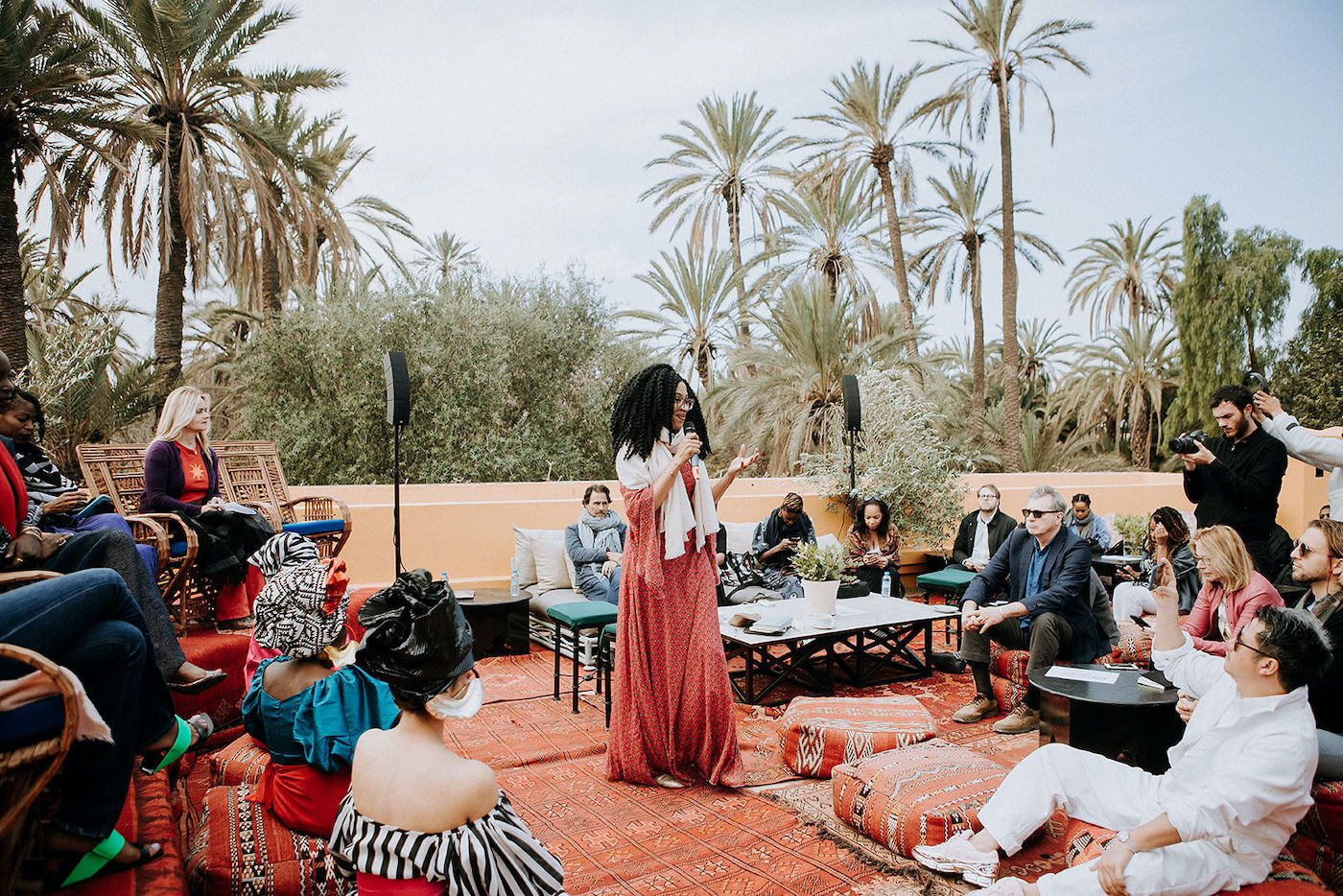Meryanne Loum-Martin calls AFRƎEculture an “homage to the Black Diaspora.” But the cultural and entrepreneurship platform she has initiated with Mashakiri Williamson this February in Marrakech also intends to celebrate arts and culture from the continent. With C& the two founders spoke about their first cultural salon and creating an exclusive circle of talent.

Enuma Okoro at Literature Salon, AFRƎEculture 2020, Marrakech. Photo: Ebony Siovhan
Contemporary And: What is the vision behind AFRƎEculture? Could you explain its structure and how your personal and professional experiences have informed its making?
Meryanne Loum-Martin: The vision is to create a yearly international rendezvous, gathering people from all over the world who are interested in the creative energy of Africa and the Diaspora. It is to create a space to discuss literature, art, cinema, and entrepreneurship. My personal experience as a hotel owner, interior designer, and a member of our Diaspora in this position has given me the opportunity to meet extraordinary people. Navigating through various circles in Europe, the US, and Africa, I was inspired to create a more diverse circle gathered around an “homage to the Black diaspora.”
Mashariki Williamson: I’ve worked in public relations, branding, and marketing for over twenty years between New York, Los Angeles, Paris, and London, specifically in the arts, entertainment, and fashion. I see AFRƎEculture as a natural extension of my career path and passions. I visited Marrakech on holiday for the first time in March 2016 and fell in love with Morocco upon arrival. So I kept coming back and at some point I said to myself: “I need a reason to be in Morocco.” When a mutual friend from LA suggested I should meet Meryanne, it started to take shape. Meryanne had this idea of doing parties reminiscent of Morocco in previous eras. Coincidentally my interests were also directed toward creativity in Africa and the historic cultural appropriation of people and countries from the continent. Understanding that so much of our global culture is either influenced or created by people of color, we decided to partner up to provide a space to celebrate that talent. In 2018 we began working on what is now AFRƎEculture.
C&: For the first edition, AFRƎEculture assembled well-known artists, writers, filmmakers, and entrepreneurs from Africa and its Diaspora. Since it is an invite-only event, who is able to participate and according to which criteria are they invited?
MW: We have an incredible advisory council with some of the most accomplished and respected individuals from across the arts and culture space. Isolde Brielmaier, Claude Grunitzky, Taiye Selasi, and Enuma Okoro, for example. Our council is divided into committees for literature, narrative arts (film), fashion, art, and music. Each committee vets potential artists, collaborators, speakers, and panelists for each salon series we host. Since we’re a group of about twenty individuals – council, founders, and communications team – we create the invite list from our individual networks.
C&: You’ve set yourself the goal of building a community that will actively create opportunities for emerging creatives and entrepreneurs. Could you tell us a bit more about that?
MW: Our goal is to do this through a four-phase process. Via creating solid and long term mentorship opportunities for young creatives. By assisting in identifying, researching, and developing greater access to funding and sustainable revenue streams. By offering support and council during the creative processes. And finally, through providing a platform via editions (salons), exhibitions, and talks, to showcase works, highlight career achievements, and promote forthcoming projects and entrepreneurial endeavours.
MLM: Next year I envision a pitch day where creatives can display developing ideas for film scripts, literature projects, design businesses, fashion collections, or accessories. I would like to have investors present that can support these projects and discover those creative minds.
C&: How are you documenting and archiving the outcomes created during these annual exchanges?
MW: We have a digital committee that documents all of our events via video and photography. Because our salons are intimate, it’s important that we create engaging content so outside viewers can feel as if they were there as well. We post in real time during the salons on social media and create daily recaps to share on Twitter and Instagram channels.
C&: The name AFRƎEculture seems to set the tone for what shall be celebrated. Could you tell us why you chose it?
MLM: It resonates phonetically with “Africa,” it reads like “freedom,” and integrates an ancient way of writing E, which reminds us how ancient our culture is. For me, it means a tribute to our ancestors’ resilience and a tribute to our living Diaspora’s energy.
Meryanne Loum-Martin, of Senegalese and West-Indian descent, is a former lawyer from Paris. She has been a resident of Marrakech for 30-years and a pioneering entrepreneur in the region. She is a board member of the Marrakech Biennale and owner of Jnane Tamsna hotel.
Mashariki Williamson, a Jamaican New Yorker, is an established brand strategist and writer of 20 years.
Interview by Mearg Negusse.
More Editorial